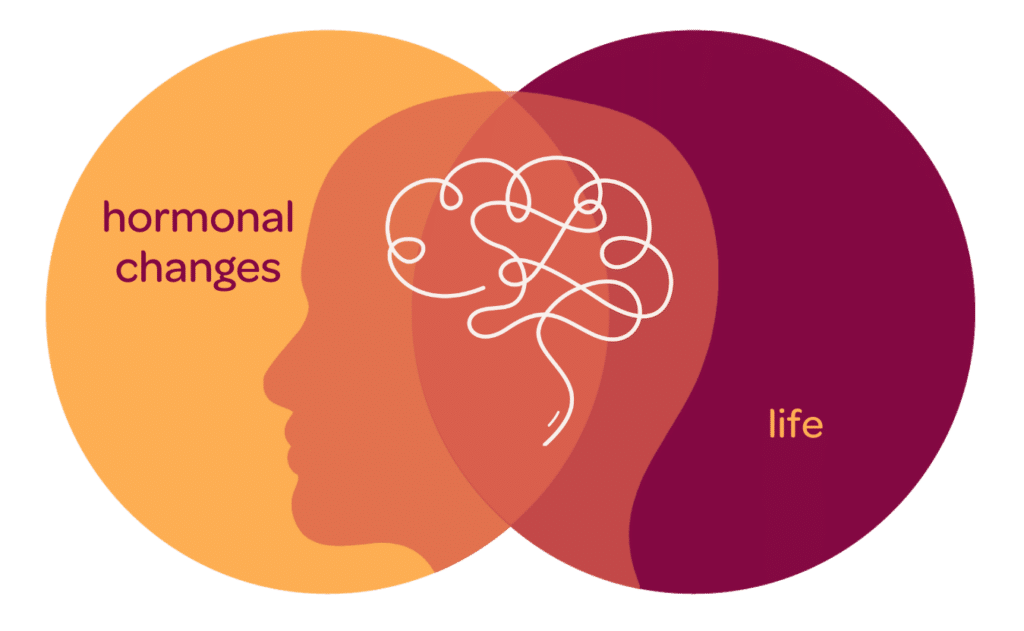
May is mental health awareness month, so this month we want to talk about menopause and mental health. Did you know that depression in women doubles around menopause?1,2 While most people know about hot flashes and menopause, many do not know that those same hormonal shifts often cause mental health changes.1,3
The hormonal changes that women experience around menopause make them more vulnerable to depressive symptoms. This may be especially hard to navigate as this is often one of the busiest times in a woman’s life — many have school-age children, a full-time career, a home, a marriage, and aging parents that need support. Add to these: the social pressures on women to remain youthful-looking, an unexpected illness, a divorce, or a sick parent and one could find herself in a perfect storm. According to the Brookings Institute’s happiness curve, 40-55 is the least happy time in most people’s lives in the USA.
Mental health changes that are common around menopause1-4 are:
- Sad, or “empty” mood
- High levels of anxiety or stress
- Persistent feelings of hopelessness, worthlessness, or anger
- Lack of pleasure in hobbies
- Decreased energy or fatigue
- Trouble concentrating, remembering, or making decisions
- Social isolation
- Changes in sleep patterns (difficulty falling asleep or staying asleep, early morning awakening, sleeping more than usual)
Important note: If one or more of these symptoms persist nearly every day for more than 2 weeks, you should consider seeking professional help.
What can you do if you have mental health changes that could be related to menopause?
- Be aware
- Know during this time you may experience mental health changes.5,6,7 Track your symptoms and get help when you need it.
- Make lifestyle changes that prioritize your self care. If you’re not already, you can start by adding in one or more of these:
- Better quality and more sleep. You can improve your sleep by turning off screens at least one hour before going to sleep and avoiding alcohol before bedtime.
- Hydrate. Yes, we know, you’re tired of hearing it — everyone says it. If you’re not already, you can make yourself one natural electrolyte drink per day for a tasty way to get more benefits and electrolytes — here are some great recipes!
- Reduce stress.6 Using practices like meditation and mindfulness can help reduce your mental load. Look for areas of your life where you are overcommitting and try to cut them back by saying “no” or delegating, to give yourself more time to unwind.
- Exercise. Again, yes, we know, you’re tired of hearing it! Even a 10 minute walk a day can boost your body and mood.
- Eat more fruits and vegetables.
- Get support from others. Lean on friends and family for support by talking to them, asking them to help with errands or chores.
- Talk to a doctor about hormone replacement therapy (HRT)
- While HRT was labeled as bad for women’s health for nearly 20 years, it’s now seen as the most safe and effective treatment of menopausal symptoms, including ones that impact your mental health. Not everyone has this new and updated information about HRT8, so be sure you have enough information to be able to discuss the pros and cons with a doctor.
- Ways to find a menopause-focused doctor:9
- Find an OB/GYN with continuing education in menopause
- Look for a provider who specializes in menopause
- Explore telemedicine options, like menopause-focused Gennev
- Talk therapy and/or medication
- Talk therapy, or psychotherapy, is an effective way of treating mental health conditions and stressors that interfere with daily life.10 If talk therapy doesn’t seem to help enough, you may need to consider talking to a mental health professional about medication.
Mental health changes around menopause are a common challenge faced by many women. If you are experiencing these symptoms, we hope you now feel less alone, and that this blog has been at least a source of ideas to help.
Sources
- North American Menopause Society: Depression & Menopause.
- Harvard Health: Menopause and Mental Health, 2020.
- AARP: Perimenopause Is More Than Hot Flashes: What Women Need to Know, 2021.
- Harvard Health: Dealing with the symptoms of menopause, 2017.
- House of Commons: Menopause and the Workplace Report, 2022-2023.
- North American Menopause Society: Stress: Getting Serious About Solutions
- The Guardian: Not just hot flushes: how menopause can destroy mental health, 2023.
- AARP: What Doctors Don’t Know About Menopause, 2018.
- Well + Good: Only 1 in 5 Gynecologists Are Trained in Menopause—Here’s When To Consider a New Doctor, 2021.
- Scotland National Health Service Inform: Menopause and Your Well Being




Leave a Reply